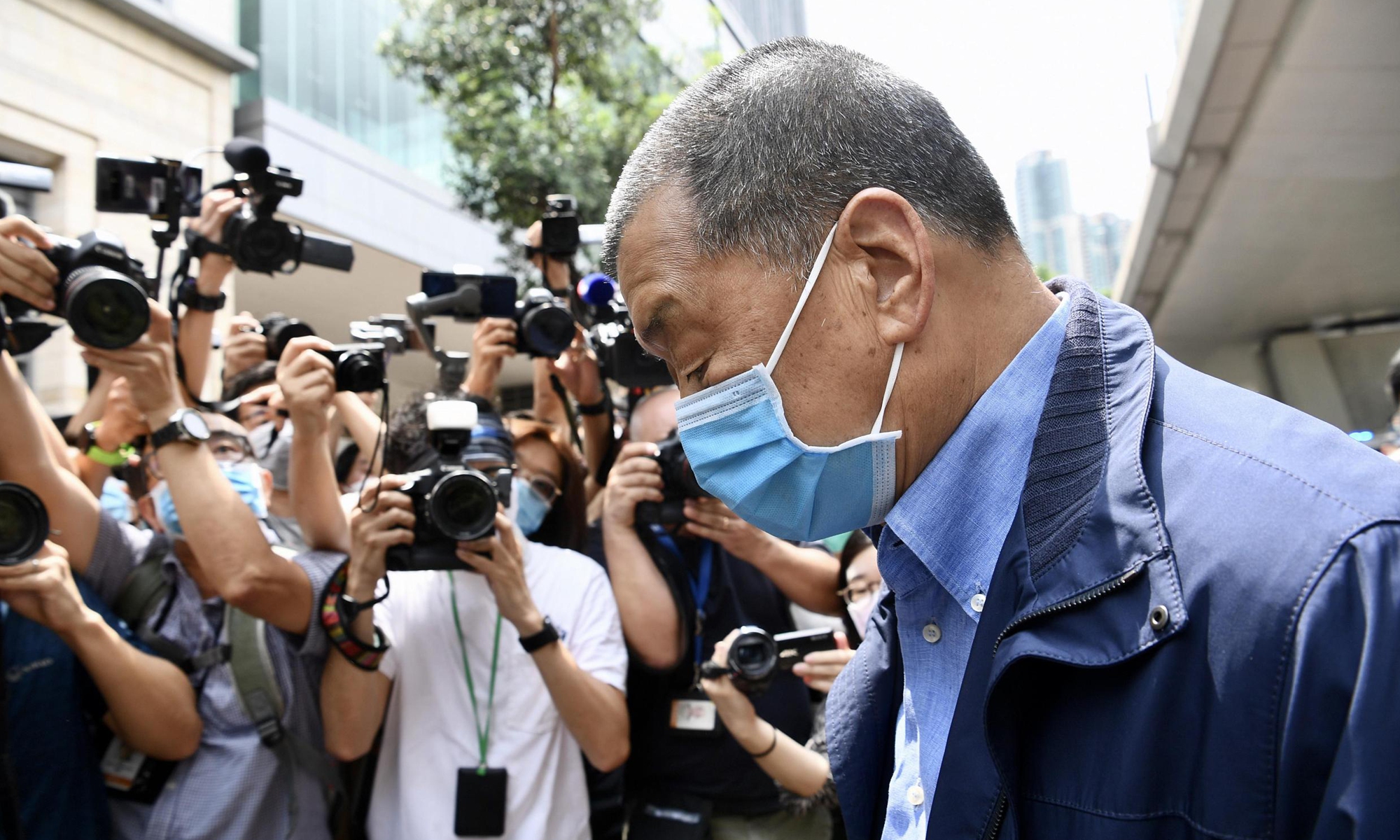Jimmy Lai bailed out, 'not released': sources
By Chen Qingqing Source: Global Times Published: 2020/8/12 11:43:47 Last Updated: 2020/8/12 18:16:20
Can’t rule out guidance by central govt office for safeguarding national security

Jimmy Lai Photo: VCG
Granting Jimmy Lai conditional bail does not mean the founder of Apple Daily is now free, and the possibility that the central government's office for safeguarding national security will oversee and provide guidance in the case can't be ruled out, a police source and legal experts told the Global Times on Wednesday.
Given the large amount of evidence seized by police and the complicated nature of the case, law enforcement authorities need more time to analyze the evidence before laying charges, a source from the Hong Kong Police Force (HKPF) told the Global Times on Wednesday.
Lai was released on bail and left the Mong Kok police station late on Tuesday after more than 40 hours of detention. Bail was set at HK$500,000 ($64,507) and his assets worth HK$50 million were frozen, according to local media reports. Lai's two sons and four senior executives of Next Digital, the parent company of Apple Daily, were also granted bail.
Agnes Chow, a major figure in the violent anti-government protests, was also granted bail after 24 hours on Monday night after she was arrested on suspicion of collusion with foreign forces. She was released on HK$20,000 bail and a personal guarantee of HK$180,000, with her passport seized.
While some anti-government forces and foreign figures that have been constantly meddling in Hong Kong affairs cheered the "release" of these high-profile riot supporters as a sign that their anti-government acts were "justified" and a vivid show of the spirit of "fighting till the end," the police source, who preferred not to be identified, said "it's standard procedure" to grant bail for suspects in accordance with the local laws in Hong Kong.
"We'll seek legal advice from the [Hong Kong] Department of Justice before bringing charges," he said, emphasizing that it does not mean the suspects were free.
According to Hong Kong laws, unless suspects are taken to court for a "holding charge," they must be released on bail within 48 hours.
Still, the national security law for Hong Kong gives the HKPF more power in handling national security-related cases, including seizing a person's passport and imposing travel restrictions, which are seen as important factors in handling cases of a complicated nature that involve endangering national security, according to the HKPF source.
"Before, if someone was arrested for theft and bailed, the person could still flee Hong Kong and go into exile before appearing in court because we couldn't seize their passport," he said, "But the situation is different now."
The central government's office for safeguarding national security in the Hong Kong Special Administrative Region (HKSAR) firmly supported the arrests that targeted Lai and other individuals, a spokesperson from the office was quoted as saying in media reports on Wednesday.
"Anyone who violates the national security law for Hong Kong or other laws would be held accountable. The office firmly supports the law enforcement of the HKPF to crack down on any activities endangering national security," the spokesperson said.
This was the first time the office expressed support on cases relevant to national security in Hong Kong. Some legal experts said this showed the possibility of the central government's office for safeguarding national security in Hong Kong to supervise and provide guidance in some cases.
"This is a high-profile case that involves suspicion of violating the national security law. Considering the large amount of material seized and other evidence, it will take time to handle the case in accordance with local legal procedures in Hong Kong," Tian Feilong, a legal expert on Hong Kong affairs at Beihang University in Beijing, told the Global Times on Wednesday.
The office has the power to supervise and guide local law enforcement authorities in Hong Kong in accordance with the law, especially when some cases are beyond the juridical capability of local authorities with complicated external factors. These cases could then be under the jurisdiction of the office, Tian said.
With the enactment of the law on safeguarding national security for Hong Kong, the office of the central people's government for safeguarding national security in Hong Kong has the jurisdiction over cases related to national security in the HKSAR, which is beyond the administration of the HKSAR government.
Given the case of Lai, which involves collusion with external forces, some legal experts said the local law enforcement authority may need help from the central government's office in obtaining evidence overseas.
"As Lai's case involves collusion with foreign forces, a national-level intelligence unit is needed in collecting relevant materials overseas," Kennedy Wong Ying-ho, solicitor of the Supreme Court of Hong Kong, told the Global Times on Wednesday.
Newspaper headline: Lai bailed out, 'not released'
RELATED ARTICLES:
- Seeing Jimmy Lai as 'freedom fighter' is naïve thinking, fails to listen to true voice of HKers
- HK&Macao affairs office supports arrest of Jimmy Lai, saying people colluding with external forces to jeopardize national security must be severely punished
- Jimmy Lai criticized for supporting infamous activist
Posted in: HK/MACAO/TAIWAN